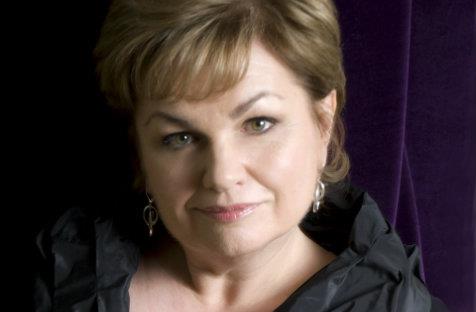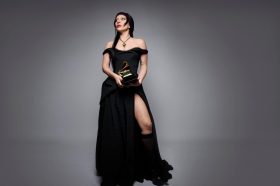As one of the world’s leading dramatic sopranos, Susan Bullock is making a welcome return to Australia’s recital and operatic stages. In addition to being the first singer to give a vocal recital in the Elisabeth Murdoch Hall, she has also won great acclaim here as Katerina in Shostakovich’s Lady Macbeth of Mtsensk for Opera Australia. Although we could perhaps view Thursday night’s recital as an appetiser for her imminent role as Brünnhilde in Wagner’s Ring Cycle, that would not be doing justice to the substantial program that she and her renowned associate artist, Malcolm Martineau, presented on Thursday night.
Bullock’s stated aim of transforming art songs into mini operas was fully realised. Without resorting to any overblown physical or vocal gestures, she brought her chosen works to life by immersing herself in the nuances of the text and the music. From the outset it was clear that Susan Bullock is a consummate communicator. Her diction is exemplary, whether singing in German, French or English, and she conveys meaning with expressive phrasing and vocal colour, simply and directly. There is always a strong sense of her emotional drive and musicality being genuine and totally devoid of artifice. Although there is sometimes a bright, penetrating edge, Bullock’s voice is surprisingly light, without any of the heaviness that is sometimes associated with singers who specialise in Wagner. It has the refinement of a classy sedan negotiating the curves and undulations smoothly rather than the exertions of a weighty truck labouring up a steep hill. Her soft singing is particularly beautiful and was used to great effect.
The first half of the program consisted of brackets of lieder by Schumann, Wolf and Joseph Marx. The five Schumann songs came from a well-trodden path, but Bullock and Martineau managed to inject a remarkable freshness into them and provide new insights. It is always exciting to hear something you have heard many, many times, such as ‘Der Nussbaum’ and find that a new interpretation illuminates it in unexpected ways. The first of the Hugo Wolf songs, ‘Nimmersatte Liebe’, revealed a wry sense of humour and the ability to create meaning and communicate directly with an audience even when not singing. Moving from that to the hushed mood of ‘Schlafendes Jesuskind’ and ‘Auf ein altes Bild’ further emphasised her versatility. Although Marx is a more modern composer (he died in 1964) the four songs chosen for this program were written in 1910 and similar musically and thematically to the earlier songs. Deeply romantic evocations of love and nature were brought to a suitable vocal climax in the final song, celebrating Spring.
The three chosen songs from the five that Debussy set to poems by Baudelaire provided a connection to Wagner, whose influence can be seen in symbolist French literature of that time and Debussy’s harmony in these works. They also provided an opportunity for both performers to display their mastery of colour. Martineau’s rippling fountain in ‘Le Jet d’eau’ was a seamless flow and the dramatic urgency of ‘Recueillement’ rendered some simply gorgeous moments. For those whose language skills made it difficult to assess just how good Susan Bullock’s diction is, the three John Ireland songs would have demonstrated the point convincingly. His setting of Rupert Brooke’s moving poem, ‘Spring Sorrow’ was one of the most affecting performances of the evening. An emphasis on subtle detail also characterised their reading of four French folksongs by Britten. Ending with these less well known Britten songs was a fitting way of marking his centenary.
Wagner was also given his celebratory due with the first encore: ‘Traüme’, from his ‘Wesendonk Lieder’. Bullock’s exquisite singing of this masterpiece would have been for some the highlight of the evening. Any ticket holders for Wagner’s Ring Cycle in the audience would have been thrilled to realise that those moments of ultimate pathos between Brünnhilde and Wotan will be very special. The Britten songs and her second encore were also a clear demonstration of her acting ability. Bullock threw herself into a most entertaining rendition of a comic song about being tone deaf (which she most decidedly is not), reminiscent of Anna Russell at her hilarious best.
Susan Bullock’s artistry and charming personality were complemented by Malcolm Martineau’s superb skills as a sensitive and responsive accompanist. Although playing with the piano at half-stick, thereby muffling the sound a little at times, their collaboration resulted in a most enjoyable and enlightening musical experience.
4 ½ stars out of 5
Great Performers 2013: Susan Bullock
Susan Bullock, soprano
Malcolm Martineau, piano
Program:
Robert Schumann – from Myrthen, Op.25
Widmung
Der Nussbaum
Die Lotosblume
Du bist wie eine Blume
Lied der Suleika
Hugo Wolf – from Gedichte von Eduard Mörike
Nimmersatte Liebe
Schlafendes Jesuskind
Auf ein altes Bild
Verborgenheit
Er ist’s
Joseph Marx
Und gestern hat er mir Rosen gebracht
Maienblüten
Selige Nacht
Hat dich die Liebe berührt
Claude Debussy – from Cinq poèmes de Baudelaire
Harmonies de soir
Le jet d’eau
Recueillement
John Ireland
If there were dreams to sell
Spring sorrow
My true love hath my heart
Benjamin Britten – from Folksong Settings Volume 2: France
Fileuse
La belle est au jardin d’amour
Il est quelqu’un sur terre
Quand j’étais chez mon père
Melbourne Recital Centre
29 August
(Pictured:Photo: Anne-Marie Le Blé)





